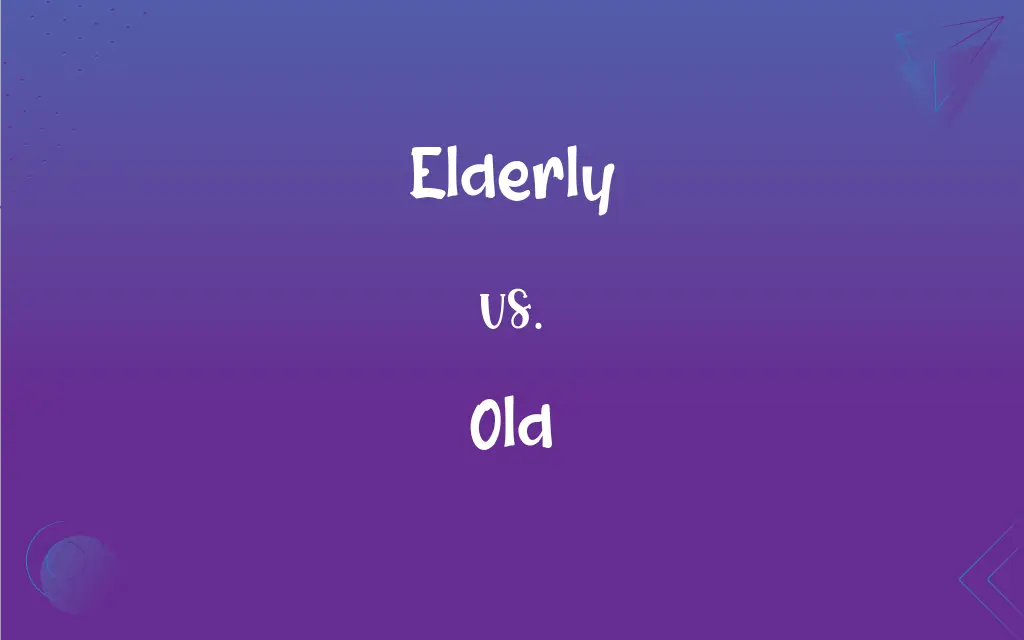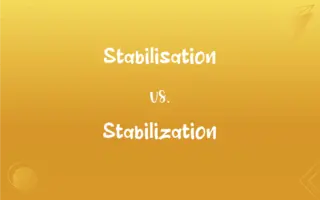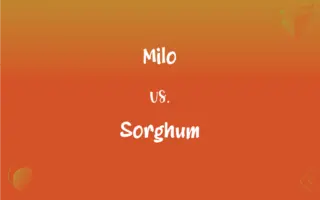Elderly vs. Old: What's the Difference?
Edited by Aimie Carlson || By Harlon Moss || Updated on March 4, 2024
"Elderly" refers to people of advanced age with a more respectful connotation, while "old" is a straightforward term that can sometimes feel blunt or disrespectful when referring to people.

Key Differences
"Elderly" is a term often used to describe individuals of advanced age, typically those who are past the middle age and moving into the later stages of life. It carries a nuance of respect and recognition of the individual's life experience. The term is frequently used in formal contexts, such as in healthcare or social services, to denote a category of people who may require additional care or consideration. On the other hand, "old" is a more general adjective that applies to all aged objects, people, and concepts, indicating that something has existed for a long time. When used to describe people, "old" can come across as less sensitive, lacking the respectful undertone often intended when speaking of those in later life stages.
The use of "elderly" versus "old" can reflect societal attitudes towards aging and the respect afforded to older individuals. While "elderly" acknowledges the dignity of aging and often implies a degree of vulnerability that may accompany advanced age, "old" does not inherently carry these connotations. This distinction is important in cultures that place a high value on respect for elders, where language reflects societal values.
In media and literature, "elderly" is used to evoke a sense of empathy or to highlight the need for care, whereas "old" is more neutral and can be used in a broader range of contexts. The choice between the two terms can significantly impact the tone and implication of a statement about age. For example, policies and discussions about the "elderly" often pertain to issues of healthcare, social support, and welfare, reflecting a societal commitment to care for this group.
Language evolves, and the preference for terms describing age can change over time. The discussion about which term is more appropriate or respectful is ongoing, with some advocating for alternatives that emphasize living well at any age, such as "seniors" or "older adults." These terms strive to strike a balance between acknowledging the reality of aging without reducing an individual's identity to their age.
Comparison Chart
Connotation
Respectful, denotes dignity and experience.
Neutral, can be perceived as less respectful.
ADVERTISEMENT
Usage Context
Often used in healthcare and social services.
Broadly used to describe age in general.
Implication
Suggests a need for care or consideration.
Simply states age without implying vulnerability.
Societal Value
Reflects a value of respect towards older age.
More general, without specific societal implications.
Alternative Terms
"Seniors", "older adults" are preferred by some for their positive connotation.
Less common alternatives due to its broad applicability.
Elderly and Old Definitions
Elderly
Pertaining to those in later stages of life, often requiring care.
The elderly population benefits from specialized healthcare programs.
ADVERTISEMENT
Old
Describes something that has existed for a long time.
The old tree in the park was planted centuries ago.
Elderly
Denotes respect for age and experience.
Elderly community members share their wisdom at the library event.
Old
Used broadly without specific age implications.
Old books have a unique charm.
Elderly
Used in formal and policy contexts.
Facilities catering to the elderly need to meet specific standards.
Old
Can apply to people, objects, and ideas.
Old philosophies still influence modern thinking.
Elderly
Implies a degree of vulnerability.
Emergency services prioritize the elderly during heatwaves.
Old
Sometimes perceived as blunt when referring to age.
He never liked being called old.
Elderly
Reflects societal attitudes towards aging.
Societal respect for the elderly is evident in many cultures.
Old
Neutral in indicating chronological age.
The old building was renovated to preserve its history.
Elderly
Being past middle age and approaching old age; rather old.
Old
Having lived or existed for a relatively long time; far advanced in years or life.
Elderly
Of, relating to, or characteristic of older persons or life in later years.
Old
Relatively advanced in age
Pamela is our oldest child.
Elderly
Pl. eld·er·lies An elderly person.
Old
Made long ago; in existence for many years
An old book.
Elderly
Pl. elderly (used with a pl. verb) Older people considered as a group. Often used with the
Special recreational programs for the elderly.
Old
Of or relating to a long life or to people who have had long lives
A ripe old age.
Elderly
Old; having lived for relatively many years.
Old
Having or exhibiting the physical characteristics of age
A prematurely old face.
Elderly
Of an object, being old-fashioned or frail due to aging.
Old
Having or exhibiting the wisdom of age; mature
A child who is old for his years.
Elderly
An elderly person.
Old
Having lived or existed for a specified length of time
She was 12 years old.
Elderly
Older people as a whole.
Old
Exhibiting the effects of time or long use; worn
An old coat.
Elderly
Somewhat old; advanced beyond middle age; bordering on old age; as, elderly people.
Old
Known through long acquaintance; long familiar
An old friend.
Elderly
Advanced in years; (`aged' is pronounced as two syllables);
Aged members of the society
Elderly residents could remember the construction of the first skyscraper
Senior citizen
Old
Skilled or able through long experience; practiced
He is an old hand at doing home repairs.
Old
Belonging to a remote or former period in history; ancient
Old fossils.
Old
Belonging to or being of an earlier time
Her old classmates.
Old
Often Old Being the earlier or earliest of two or more related objects, stages, versions, or periods.
Old
Having become slower in flow and less vigorous in action. Used of a river.
Old
Having become simpler in form and of lower relief. Used of a landform.
Old
Used as an intensive
Come back any old time. Don't give me any ol' excuse.
Old
Used to express affection or familiarity
Good ol' Sam.
Old
An individual of a specified age
A five-year-old.
Old
Old people considered as a group. Used with the
Caring for the old.
Old
Former times; yore
In days of old.
Old
Of an object, concept, relationship, etc., having existed for a relatively long period of time.
An old abandoned building
An old friend
Old
Of a living being, having lived for most of the expected years.
A wrinkled old man
Old
Of a perishable item, having existed for most of, or more than, its shelf life.
An old loaf of bread
Old
Of a species or language, belonging to a lineage that is distantly related others
The ginkgo is one of the oldest living trees
Basque is the oldest language in Europe
Old
Having been used and thus no longer new or unused.
I find that an old toothbrush is good to clean the keyboard with.
Old
Having existed or lived for the specified time.
How old are they? She’s five years old and he's seven. We also have a young teen and a two-year-old child.
My great-grandfather lived to be a hundred and one years old.
Old
(heading) Of an earlier time.
Old
Former, previous.
My new car is not as good as my old one.
A school reunion for Old Etonians
Old
That is no longer in existence.
The footpath follows the route of an old railway line.
Old
Obsolete; out-of-date.
That is the old way of doing things; now we do it this way.
Old
Familiar.
When he got drunk and quarrelsome they just gave him the old heave-ho.
Old
(UK) Being a graduate or alumnus of a school, especially a public school.
Old
Tiresome after prolonged repetition.
Your constant pestering is getting old.
Old
Said of subdued colors, particularly reds, pinks and oranges, as if they had faded over time.
Old
A grammatical intensifier, often used in describing something positive, and combined with another adjective.
We're having a good old time.
My next car will be a big old SUV.
My wife makes the best little old apple pie in Texas.
Any old
Old
(obsolete) Excessive, abundant.
Old
|invariable plural only}} People who are old; old beings; the older generation, taken as a group.
A civilised society should always look after the old in the community.
Old
(slang) A person older than oneself, especially an adult in relation to a teenager.
Old
One's parents.
I had to sneak out to meet my girlfriend and tell the olds I was going to the library.
Old
A typically dark-coloured lager brewed by the traditional top-fermentation method.
Old
Open country.
Old
Not young; advanced far in years or life; having lived till toward the end of the ordinary term of living; as, an old man; an old age; an old horse; an old tree.
Let not old age disgrace my high desire.
The melancholy news that we grow old.
Old
Not new or fresh; not recently made or produced; having existed for a long time; as, old wine; an old friendship.
Old
Formerly existing; ancient; not modern; preceding; original; as, an old law; an old custom; an old promise.
Old
Continued in life; advanced in the course of existence; having (a certain) length of existence; - designating the age of a person or thing; as, an infant a few hours old; a cathedral centuries old.
And Pharaoh said unto Jacob, How old art thou?
Old
Long practiced; hence, skilled; experienced; cunning; as, an old offender; old in vice.
Vane, young in years, but in sage counsel old.
Old
Long cultivated; as, an old farm; old land, as opposed to new land, that is, to land lately cleared.
Old
Worn out; weakened or exhausted by use; past usefulness; as, old shoes; old clothes.
Old
More than enough; abundant.
If a man were porter of hell gate, he should have old turning the key.
Old
Aged; antiquated; hence, wanting in the mental vigor or other qualities belonging to youth; - used disparagingly as a term of reproach.
Old
Old-fashioned; wonted; customary; as of old; as, the good old times; hence, colloquially, gay; jolly.
Old
Used colloquially as a term of cordiality and familiarity.
Old
Past times (especially in the phrase `in days of old')
Old
(used especially of persons) having lived for a relatively long time or attained a specific age; especially not young; often used as a combining form to indicate an age as specified as in `a week-old baby';
An old man's eagle mind
His mother is very old
A ripe old age
How old are you?
Old
Of long duration; not new;
Old tradition
Old house
Old wine
Old country
Old friendships
Old money
Old
Of an earlier time;
His old classmates
Old
(used for emphasis) very familiar;
Good old boy
Same old story
Old
Lacking originality or spontaneity; no longer new;
Moth-eaten theories about race
Old
Just preceding something else in time or order;
The previous owner
My old house was larger
Old
Of a very early stage in development;
Old English is also called Anglo Saxon
Old High German is High German from the middle of the 9th to the end of the 11th century
Old
Old in experience;
An old offender
The older soldiers
Old
Used informally especially for emphasis;
A real honest-to-god live cowboy
Had us a high old time
Went upriver to look at a sure-enough fish wheel
FAQs
Can "old" ever be used positively?
Yes, "old" can be used positively, especially when referring to objects or concepts valued for their longevity and quality, but it's more nuanced when applied to people.
Which is more respectful, "elderly" or "old"?
"Elderly" is generally considered more respectful when referring to people of advanced age.
Why is "elderly" preferred in healthcare?
"Elderly" is preferred in healthcare because it conveys a sense of respect and acknowledges the specific needs of older adults.
Is it ever appropriate to use "old" to describe people?
While it's not inherently inappropriate, the context and tone matter, and alternatives like "elderly" or "older adult" are often preferred for their respectful connotation.
How do cultural perceptions of age influence language?
Cultural perceptions significantly influence language, with terms used to describe age reflecting societal respect, values, and attitudes towards aging.
Are there any emerging terms for describing older age?
Terms like "seniors" and "older adults" are emerging as preferred alternatives for their positive connotation and emphasis on living well at any age.
Can the preference for "elderly" or "old" vary by individual?
Yes, individual preferences vary, and some may prefer one term over the other or choose entirely different descriptors based on personal identity or views on aging.
How does the term "old" compare to "elderly" in terms of linguistic efficiency?
"Old" is linguistically more efficient due to its brevity and broad applicability; however, "elderly" provides a more specific and often more respectful context when referring to people.
How does the media's portrayal of age affect public perception?
Media portrayal can reinforce stereotypes or challenge them, influencing how society views aging and the terminology deemed respectful or appropriate.
Can the preference for terms change with an individual's age?
Yes, individuals' preferences for how they are described can change with age, reflecting their changing identity, attitudes towards aging, and reactions to societal perceptions of age.
What impact does referring to someone as "elderly" have on their self-perception?
Referring to someone as "elderly" can impact their self-perception by potentially making them feel valued for their experience or, conversely, marginalized due to age. The impact varies based on personal and cultural attitudes towards aging.
How do different cultures express respect for older individuals through language?
Cultures express respect for older individuals through language by using terms and titles that denote honor, reverence, or status, reflecting societal values that esteem age and experience.
Why might some older individuals prefer not to be called "elderly"?
Some older individuals might prefer not to be called "elderly" because they feel it doesn't accurately represent their activity level, health, or how they view themselves, associating the term with frailty or dependency.
How does the legal or policy context influence the use of "elderly" vs. "old"?
In legal and policy contexts, "elderly" is often used to define specific age groups eligible for certain benefits or protections, reflecting a formal and respectful approach to addressing the needs of older populations.
What role does inclusivity play in discussing terminology for aging populations?
Inclusivity plays a crucial role in discussing terminology for aging populations by ensuring language respects and reflects the diversity of experiences, preferences, and identities within older demographics, promoting dignity and respect for all.
What role does sensitivity play in choosing between "elderly" and "old"?
Sensitivity is crucial; choosing terms that respect individuals' dignity and avoid reinforcing negative stereotypes about aging is important.
How do language choices reflect broader societal trends regarding aging?
Language choices, including the preference for "elderly" or "old," reflect and influence societal trends and attitudes towards aging, including respect, inclusivity, and recognition of the contributions of older adults.
Are there any health implications associated with the societal perception of being "elderly"?
Yes, societal perceptions of being "elderly" can affect individuals' health by influencing their access to resources, levels of social support, mental health, and overall well-being, depending on whether aging is viewed positively or negatively.
How do terms like "elderly" and "old" influence societal attitudes towards aging?
Terms like "elderly" and "old" can reinforce or challenge societal attitudes towards aging, either by perpetuating stereotypes about age or by promoting a more inclusive and respectful view of the aging process.
What are the challenges in creating universally accepted terms for aging?
The challenges include varying cultural perceptions of aging, individual preferences, and the evolving nature of language, which together make it difficult to find terms that are universally accepted and respectful.
About Author
Written by
Harlon MossHarlon is a seasoned quality moderator and accomplished content writer for Difference Wiki. An alumnus of the prestigious University of California, he earned his degree in Computer Science. Leveraging his academic background, Harlon brings a meticulous and informed perspective to his work, ensuring content accuracy and excellence.
Edited by
Aimie CarlsonAimie Carlson, holding a master's degree in English literature, is a fervent English language enthusiast. She lends her writing talents to Difference Wiki, a prominent website that specializes in comparisons, offering readers insightful analyses that both captivate and inform.































































